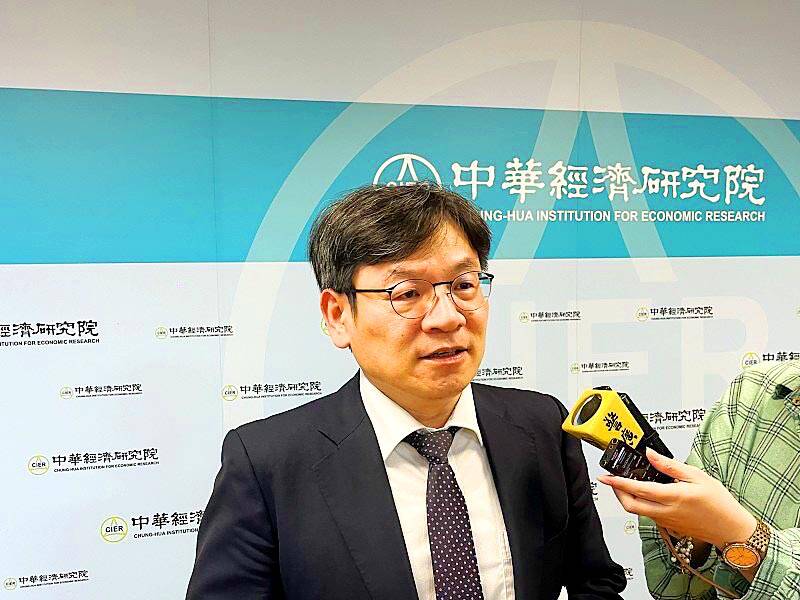Chung-Hua Institution for Economic Research (CIER, 中華經濟研究院) yesterday raised its forecast for Taiwan’s GDP growth from 3.1 percent to 3.38 percent, as exports could receive a bigger boost from global artificial intelligence (AI) demand.
“The nation’s exports would start to set sail from this quarter, thanks to better order visibility,” CIER president Yeh Chun-hsien (葉俊顯) said.
Exports, the main growth driver that accounts for 60 percent of GDP, would shift from a 9.8 percent decline last year to a 7.89 percent increase this year, as inventory adjustments come to a close, the think tank said.

Photo: Hsu Tzu-ling, Taipei Times
The low base last year would also help and explain why the recovery momentum would ease off quarter by quarter, Yeh said.
GDP growth is predicted to reach 5.57 percent last quarter, and to slow to 3.55 percent this quarter, 3 percent next quarter and 1.66 percent in the final quarter, he added.
Global AI demand has been stronger than expected and would ramp up businesses of local tech firms on its supply chain, Yeh said.
Revenue from AI server chips would more than double this year and would account for 20 percent of overall sales by 2028 from a contribution that is currently in the low teens, Taiwan Semiconductor Manufacturing Co (TSMC, 台積電) told investors on Thursday.
Yeh said the upward revision also aims to reflect an increase in government expenditure that would expand 2.68 percent this year to build up national defense and armament procurements.
Private consumption would register a healthy 2.09 percent gain, falling from an 8.32 percent uptick, as demand for outbound travel holds sturdy, especially after an earthquake which measured a 7.2 on the Richter scale jolted Hualien on April 3 and is expected to hinder tourism in eastern Taiwan, Yeh added.
CIER has a dim view on private investment, saying that the GDP component would shrink 0.2 percent this year after a deep 11.6 percent retreat last year.
Local firms remain cautious about capital spending, as the US Federal Reserve appears unlikely to cut interest rates anytime soon and Taiwan’s central bank last month unexpectedly raised borrowing costs by 0.125 percentage points, Yeh said.
Sticky inflation and spiking geopolitical tensions lent support to a conservative approach, he added.
CIER is looking at an inflation of 2.3 percent, which is above the central bank’s 2 percent alarm, mitigating little from a 2.49 percent rise last year.

SELL-OFF: Investors expect tariff-driven volatility as the local boarse reopens today, while analysts say government support and solid fundamentals would steady sentiment Local investors are bracing for a sharp market downturn today as the nation’s financial markets resume trading following a two-day closure for national holidays before the weekend, with sentiment rattled by US President Donald Trump’s sweeping tariff announcement. Trump’s unveiling of new “reciprocal tariffs” on Wednesday triggered a sell-off in global markets, with the FTSE Taiwan Index Futures — a benchmark for Taiwanese equities traded in Singapore — tumbling 9.2 percent over the past two sessions. Meanwhile, the American depositary receipts (ADRs) of Taiwan Semiconductor Manufacturing Co (TSMC, 台積電), the most heavily weighted stock on the TAIEX, plunged 13.8 percent in

A wave of stop-loss selling and panic selling hit Taiwan's stock market at its opening today, with the weighted index plunging 2,086 points — a drop of more than 9.7 percent — marking the largest intraday point and percentage loss on record. The index bottomed out at 19,212.02, while futures were locked limit-down, with more than 1,000 stocks hitting their daily drop limit. Three heavyweight stocks — Taiwan Semiconductor Manufacturing Co (TSMC, 台積電), Hon Hai Precision Industry Co (Foxconn, 鴻海精密) and MediaTek (聯發科) — hit their limit-down prices as soon as the market opened, falling to NT$848 (US$25.54), NT$138.5 and NT$1,295 respectively. TSMC's

ASML Holding NV, the sole producer of the most advanced machines used in semiconductor manufacturing, said geopolitical tensions are harming innovation a day after US President Donald Trump levied massive tariffs that promise to disrupt trade flows across the entire world. “Our industry has been built basically on the ability of people to work together, to innovate together,” ASML chief executive officer Christophe Fouquet said in a recorded message at a Thursday industry event in the Netherlands. Export controls and increasing geopolitical tensions challenge that collaboration, he said, without specifically addressing the new US tariffs. Tech executives in the EU, which is

In a small town in Paraguay, a showdown is brewing between traditional producers of yerba mate, a bitter herbal tea popular across South America, and miners of a shinier treasure: gold. A rush for the precious metal is pitting mate growers and indigenous groups against the expanding operations of small-scale miners who, until recently, were their neighbors, not nemeses. “They [the miners] have destroyed everything... The canals, springs, swamps,” said Vidal Britez, president of the Yerba Mate Producers’ Association of the town of Paso Yobai, about 210km east of capital Asuncion. “You can see the pollution from the dead fish.